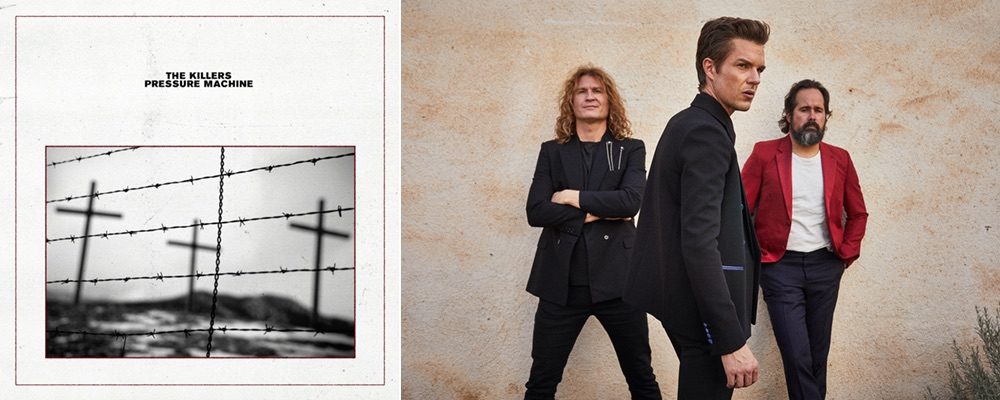The Killers Pay Tribute to Small Town Despair on Dust Bowl Odyssey ‘Pressure Machine’
Todd Gilchrist
At a time when rock ‘n’ roll is more out of vogue than ever before, you have to hand it to the Killers: they found a way to absorb lots of different elements from genres that supplanted its commercial stature while continuing to deliver guitar-bass-and-drum music that feels fully authentic. “Pressure Machine” is the group’s second album since the beginning of the pandemic, and the first recorded during it. It carries many of the hallmarks of quarantine songwriting, including a decidedly more introspective tone and a sense of shared experience, whether you’re a rock star that spent part of your adolescence in Nephi, Utah or one of the locals that National Public Radio profiles in clips that precede almost every track. Not quite the Dust Bowl masterpiece of Bruce Springsteen’s “Nebraska,” “Pressure Machine” unfolds a bit like a sampler or compilation album of the sounds of 2021 rock ‘n’ roll — call it the soundtrack to contemporary small town despair — as lead singer Brandon Flowers delivers some of the most vivid and yet unforced songs of their distinguished career.
There’s always a risk of theatricality, the affectation of empathy without anything underneath, with rock stars who offer portraits of the blue-collar folks that gravitate to their music. The recordings that connect the album’s eleven tracks almost immediately gird its bona fides, as they literally give these characters a platform to speak their truths. Also, anachronistic instruments like Sara Watkins’ fiddle are thankfully used sparingly on the opening track “West Hills,” while Flowers earnestly catalogues a roundup of rural “types” with tough lives and tougher stories; when she returns a few songs later for “Cody,” Flowers employs her instrument as punctuation while he narrows his view to highlight the kind of kid that’s too restless to stay in his small town, but not strong enough to leave. In between, electronic drums and watery synths serve as a nostalgic reminder of modernity on “Quiet Town,” a chronicle of tragedies that turn from myth into melancholy reality, before the band strips down to almost nothing for “Terrible Thing,” a heartbreaking tribute to a gay friend’s suicidal thoughts as a teenager.
“Sleepwalker” propels the record in a different direction with its empathetic, if not quite sunny, encouragement of dreamers to be unafraid of reality, before “Runaway Horses” enlists Phoebe Bridgers for a look at a young woman who “put away childish things,” and in so doing repressed all of the colorful, unique adventuresome impulses that made her so special at the moment that Flowers’ narrator knew her. Pulsing with synth vines like a midwestern Cars cover band, Flowers offers the few-years-later counterpoint to that young woman’s perspective on “In The Car Outside,” the story of the man married to that young woman, or one like her, who has retreated into regret and isolation to protect her from a reality that may well include a man who earnestly loves her, but he (at least) is not the one she wants. And then “In Another Life” strikes deepest with the could-have-beens as Flowers adopts to perspective of a small town lifer who wonders if his partner saw herself in his arms as he combs the same streets they grew up on: “Am I the man you hoped I’d be?” he asks desperately.
Flowers splits the narrative of “Desperate Things” between an abused woman and a philandering man to highlight some sad truths about human nature (“When you’re in love / You can be blinded by your own heart / You’ll bend your own truth / So twisted up you could justify sin”), then casts a wider net to empathize with people locked in cycles of poverty-line domesticity; as he hears the end of the album, he sings, “Ain’t nothing wrong with working class,” but the takeaway from his vignettes is that there’s a lot more bitter than sweet about living in rural Utah. And that’s probably true, but surely there’s a balance between those who are struggling, those making the best of it and the few who may be perfectly happy with a path that led them no further than the other end of their hometown.
Flowers closes the album with “The Getting By,” about another individual reckoning with that daily struggle and the stuff it takes to endure a life of mundane repetition. And like with its predecessors, there’s a clear abundance of compassion in the song for the band’s subjects as Flowers turns them into folk heroes. But if “Pressure Machine” exemplifies the best of what rock music can do, in its heyday and now, musically and thematically, it’s just a little bit of a shame that the individuals they seek to honor don’t receive the same kind of grace. Because it is lovely that these big-time musicians have decided to focus their skills on a collection of songs about the Joe Sixpacks in their audience, especially since they mostly do them justice; but when every story is filled with varying degrees of sadness and disappointment, it’s hard not to feel like their efforts to celebrate these very real people isn’t mixed in with a little bit of rock-star condescension, even if it’s only accidental.
“Pressure Machine” releases Aug. 13 on Apple Music.

